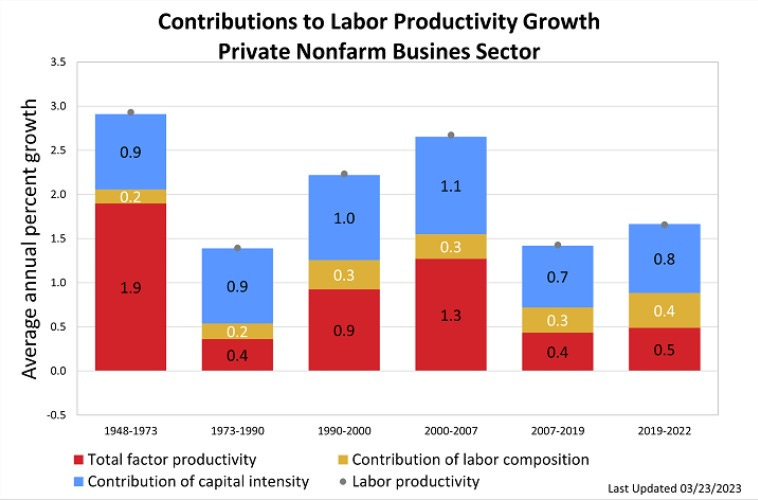⤴ Critics of Marc Andreessen's Techno-Optimist Manifesto fail basic economics
Too many journalists have been soaking for too long in silly tales of 'late capitalism'
Quote of the Issue
“The rise and fall of images of the future precedes or accompanies the rise and fall of cultures.” Dutch futurist Frederik Polak in The Image of the Future
Now on sale absoutely everywhere:
My new book The Conservative Futurist: How To Create the Sci-Fi World We Were Promised
The Essay
⤴ Critics of Marc Andreessen's Techno-Optimist Manifesto fail basic economics
Two weeks after the launch of my techno-optimist book, The Conservative Futurist: How to Create the Sci-Fi World We Were Promised, venture capitalist Marc Andreessen published “The Techno-Optimist Manifesto.” Much to my delight (but not to my surprise), the 100,000-word book and 5,000-word manifesto go together wonderfully. Here’s Andreessen:
We believe technology makes greatness more possible and more likely. We believe in fulfilling our potential, becoming fully human – for ourselves, our communities, and our society. Techno-Optimism is a material philosophy, not a political philosophy. We are not necessarily left wing, although some of us are. We are not necessarily right wing, although some of us are. We are materially focused, for a reason – to open the aperture on how we may choose to live amid material abundance.
And here’s me:
America must again become what I call an Up Wing country. Up Wing is my shorthand for a solution-oriented future optimism, for the notion that rapid economic growth driven by technological progress can solve big problems and create a better world of more prosperity, opportunity, and flourishing. The most crucial divide for the future of America isn’t left wing versus right wing. It’s Up Wing versus Down Wing. Down Wing is about accepting limits, even yearning for them. Down Wingers are doomsters. Up Wing is about accelerating past limits — much as a rocket accelerates up through Earth’s gravity well. Up Wingers are boomsters. Down Wing eschews risk, especially from innovation, unless possible threats to everyday life and the environment are well understood. The burden of proof is on the risk taker. Up Wing embraces calculated risk-taking, especially from innovation, as essential to human progress and sees the capacity for such progress as central to our humanity. The burden of proof is on the defender of stasis.
Andreessen and I both believe tech-driven economic growth is what generates a better world of more wealth and satisfaction, less despair and suffering. We both believe innovative, entrepreneurial, free-market capitalism is the best way to organize an economy capable of generating tech-driven economic growth. We both believe that although a wealthier, healthier, and more resilient world for all is possible, this isn’t some Utopian project. It’s about, as Andreessen writes, “doing the best fallen humanity can do, making things better as we go.” Great stuff.
But some people hate the Manifesto and, I would guess, would also hate the Book for pretty much the same supposed reasons: Both are examples of blind faith in markets and technology to create a problem-free fantasy world. It’s a cartoonish attack found in the following pieces, which seems to be a pretty representative sample:
“When was the last time Marc Andreessen talked to a poor person?” - Amanda Silberling, Dominic-Madori Davis, and Kyle Wiggers, TechCrunch
“Marc Andreessen Is Wrong About Everything” - Lucas Ropek, Gizmdo
“I read Andreessen’s ‘techno-optimist manifesto’ so you don’t have to” - Jemima Kelly, Financial Times
At the core of the collective critique is a profound misunderstanding of the way the world works — specifically why everyone everywhere used to be really poor and why that’s no longer the case. This quote from Gizmodo’s Ropek (bold by me) is telling:
In general, the most distressing thing about the techno-optimist’s manifesto is that it’s basically just a big apology for unrestrained capitalism. Andreessen’s document is a hodgepodge of bad libertarian economics that aren’t based on anything resembling social or fiscal realities but are, more or less, an excuse for bad corporate behavior. In the past, Andreessen has quibbled on his commitment to libertarianism, though I am very much a proponent of the theory that things that walk and quack like ducks are, in fact, ducks. For example, here is one snapshot of Andreessen’s thinking: “Productivity growth, powered by technology, is the main driver of economic growth, wage growth, and the creation of new industries and new jobs, as people and capital are continuously freed to do more important, valuable things than in the past.”
That “snapshot of Andreessen’s thinking” isn’t “libertarian economics” or “trickle-down economics” or “neoliberal economics,” it’s economics. Like, total Econ 101 stuff, really.
To quote Paul Krugman, that well-known hard-right, libertarian columnist and Nobel laureate, “Productivity isn’t everything, but in the long run, it’s almost everything.” Or this from Harvard University economist Gregory Mankiw, as stated in his popular college textbook: “Long-run economic growth is the single most important determinant of the economic well-being of a nation’s citizens. Everything else that macroeconomists study — unemployment, inflation, trade deficits, and so on — pales in comparison.”
And what drives economic growth? Productivity growth. The below chart shows just how much harder it is for the US economy to grow as fast in the future as it has in the past given that labor force growth has faded significantly due to demographic reasons. Productivity growth typically does the heavy lifting, and that will be even more true in the future:
And what drives productivity growth over the long run? Technological progress. A brief explainer from the St. Lous Fed:
It has been shown, both theoretically and empirically, that technological progress is the main driver of long-run growth. The explanation is actually quite straightforward. Holding other input factors constant, the additional output obtained when adding one extra unit input of capital or labor will eventually decline, according to the law of diminishing returns. As a result, a country cannot maintain its long-run growth by simply accumulating more capital or labor. Therefore, the driver of long-run growth has to be technological progress.
I call this the Arrow of Prosperity: tech progress and innovation (factories shifting to electric motors from steam, jet engines, atomic reactors, the shipping container, the microchip) → drives productivity growth → productivity growth drives economic growth → and economic growth drives higher incomes for everyone over the long.
And what sort of socioeconomic system is best able to generate technological progress and business innovation? The one that currently dominates this planet. Andreessen:
Willing buyer meets willing seller, a price is struck, both sides benefit from the exchange or it doesn’t happen. Profits are the incentive for producing supply that fulfills demand. Prices encode information about supply and demand. Markets cause entrepreneurs to seek out high prices as a signal of opportunity to create new wealth by driving those prices down. We believe the market economy is a discovery machine, a form of intelligence – an exploratory, evolutionary, adaptive system.
Note: None of this means government doesn’t have a big role to play, such as doing the sort of blue-sky R&D that business tends not to do. But a vital free enterprise system plays a necessary role. Likewise, government mustn’t side with incumbency and stasis over entrepreneurial upstarts and creative destruction. As economist Carl Benedikt Frey writes in The Technology Trap, “One reason economic growth was stagnant for millennia is that the world was caught in a technology trap, in which labor-replacing technology was consistently and vigorously resisted for fear of its destabilizing force.” Without the freedom — the build, create, and disrupt — the Arrow of Progress will never leave its quiver.
So far, at least, Andreessen’s critics are so stuck in their idological “all billionaires are a policy error” cage that they don’t get how silly and uninformed they sound.
Micro Reads
▶ A surprisingly radical proposal: Make people happier — not just wealthier and healthier - Sigal Samuel, VOX |
▶ Economic growth prospects in the face of population ageing - Rainer Kotschy and David Bloom, CEPR |
▶ DNA Nano Engine: The Revolutionary Power Behind Tomorrow’s Nanomachines - Arizona State University, SciTechDaily |
▶ AI Adoption in America: Who, What, and Where - Kristina McElheran, J. Frank Li, Erik Brynjolfsson, et al., NBER |
▶ Occupational Heterogeneity in Exposure to Generative AI - Edward W. Felten, Manav Raj, and Robert Seamans, SSRN |
▶ From doom to boom: AI is slowly re-energizing San Francisco - Danielle Abril, WaPo |
▶ Dropping Out of College to Join the AI Gold Rush - Lindsay Ellia, WSJ |
▶ China has a new plan for judging the safety of generative AI—and it’s packed with details - Zeyi Yang, MIT Technology Review |
▶ Britain’s Big AI Summit Is a Doom-Obsessed Mess - Peter Guest, WIRED |
▶ South Korean Christians turn to AI for prayer - Song Jung-a and Christian Davies, FT |
▶ Hydrogen Electrolysis Can Give Nuclear Power a Boost - Tammy Xu, IEEE Spectrum |
▶ A Deep Learning Analysis of Climate Change, Innovation, and Uncertainty - Michael Barnett, William Brock, Lars Peter Hansen, Ruimeng Hu, and Joseph Huang, arXiv |
▶ This startup wants to find out if humans can have babies in space - Scott Solomon, MIT Technology Review |
▶ Space is starting to look like the better mining operation - Ramin Skibba, Ars Technica |
▶ DARPA is asking a $170 billion question about making money on the Moon - Tim Fernholz, Quartz |
▶ Lunar Highways: How Lasers Can Transform Moon Dust Into Roads - European Space Agency, SciTechDaily |
▶ SpaceX Signs Deal to Launch Key European Satellites - Matthew Dalton and Micah Maidenberg |
▶ Personal aviation is about to get interesting - Eli Dourado |
▶ Nike Super Shoes Aren’t Performance-Enhancing Drugs - Adam Minter, Bloomberg Opinion |
▶The Ray-Ban Meta smart glasses actually make the future look cool- Victoria Song, The Verge |






That Gizmodo piece is so cringe-inducingly awful. My goodness.
Nice. I’ll add your book to my reading list.
I’d say, however that people aren’t necessarily criticising his manifesto because they don’t believe in the idea that technology drives productivity, which drives growth and prosperity.
I agree with him on that 100%.
But not every human problem is about economic growth. That’s reductive and therefore destructive.
And second, I see that you at least acknowledge the role of some regulation or government funded R&D, which he plainly dismisses. There needs to be a balancing, opposing force to ensure we don’t accidentally induce a wipeout, tail risk event due to carelessly marching off a cliff